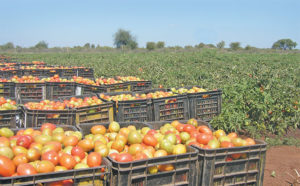
February 1, 2019//-The cost of cherry tomatoes could increase by more than 10% if there is a no deal Brexit, say growers in southern Spain.
Earlier this week, I visited a vast site near Alicante, where 60 million kilograms of cherry tomatoes are grown, picked and shipped every year and a third of them are bound for the UK.
But growers are worried that a no deal Brexit is going to push up the price we pay for them in the shops.
Jorge Brotons is the commercial director for Bonnysa and deals with all the big UK supermarkets. The business has been growing tomatoes for the UK since 1956.
“We’re trying to understand what the different scenarios can be. If there is no deal, we’ll have to trade in a different way as tariffs will be applied, new inspections and this means we add new processes to current situations,” he says
Ultimately it means more work, more time, more people to make checks and all that means more costs.
“The cost in agriculture and margins are very very tight, and the history of prices shows tomatoes haven’t increased in 15 years,” he says.
“With all costs increasing our margins are so tight – we can’t absorb any more cost and any more costs in that chain means losses and having to decide to do something else.”
We start the day at Bonnysa’s vast greenhouse complex which spans a huge valley in northern Alicante. The sun shines brightly and the temperature is around 15 degrees, a reminder of why salad growing here is much easier than in the UK in January.
In the greenhouse we visit, we meet two pickers undertaking the fortnightly harvest. Within 15 minutes they’ve gathered trays of their bright red bounty and it is on to the factory for processing.
The pickers have no idea how many cherry tomatoes pass across the factory floor per year – they laugh when I ask. And it’s not hard to understand why. They’re everywhere.
One sorting line spreads them, then photographs them and another separates them. We see all of the big UK supermarkets’ labels on the boxes bound for the UK (hop over to this website to know more), but I can’t tell you who they are as the firms requested confidentiality. For them, it is too sensitive to be heard talking about Brexit – even when it’s just tomatoes.
Angel Jiminez is director of exports at Trota, a logistics firms that sends 200 lorries of tomatoes to the UK every week.
So how would a no deal Brexit affect their business? “Right now there is no paperwork involved to cross the border and we can cross easily, but more paperwork means delays. Time is money, more days is more time – and it is the final buyer who pays for everything.”
He also says the haulier industry is no where near prepared enough: “Brexit is not going to be easy at the beginning.”
Uri is one of the many Trota drivers that transport Bonnysa’s cherry tomatoes to the UK. It’s Monday and he’s just about to begin the 2,000km journey from the Alicante plant, across Spain and France, and on to Britain through the Channel Tunnel.
Eurotunnel is the preferred crossing for most perishable food items, and by volume the tunnel carries more food than car parts because of its speed and access to market. For Bonnysa it is vital that it continues to function smoothly after Brexit, whatever deal is achieved.
At least according to the company that operates the tunnel, firms need not worry.
“Here at Eurotunnel we’re ready, soft Brexit, hard Brexit we’ve been preparing for two and a half years. We’ve taken the worst case scenario as our goal all the way through,” says John Keefe, director of public affairs at Eurotunnel.
“We will be able to deliver our transport system from day one from both sides.”
I join Uri in the truck from Calais and we head through the tunnel and into Folkestone for the final leg of his journey – on to the supermarket distribution centre.
All in all, it takes just over two and a half days to transport a tomato from Bonyssa’s vines to sub-zero temperatures in Dartford.
They’ll be on the supermarkets on Friday in time for your weekend salad.
There is zero friction on our journey (apart from some snow), but the concern from Spain is that the introduction of new checks and customs at any point in the trip will add new costs if there’s a no deal Brexit – and that means higher prices for UK shoppers, a thought shared by Justin King, former boss of Sainsbury’s.
“The nature of our very efficient food supply chain is there is little surplus cost or margin along the way,” he says. “The more inefficient it becomes, the ability of suppliers and retailers to absorb that is very limited. They will be passed on to consumers and really quite quickly.”


